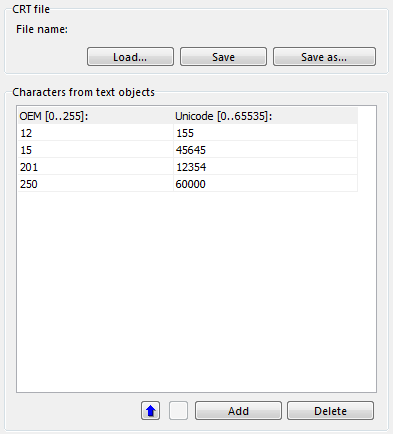Übersetzungstabelle: Unterschied zwischen den Versionen
FBO (Diskussion | Beiträge) Keine Bearbeitungszusammenfassung |
FBO (Diskussion | Beiträge) Keine Bearbeitungszusammenfassung |
||
| Zeile 19: | Zeile 19: | ||
| '''[[Map#Convert Text Objects from OEM to Unicode|Convert Text Objects from OEM to Unicode]]''' || Unicode (0..65535) || OEM character code (0..255) | | '''[[Map#Convert Text Objects from OEM to Unicode|Convert Text Objects from OEM to Unicode]]''' || Unicode (0..65535) || OEM character code (0..255) | ||
|- | |- | ||
| '''[[Colors#Load_Colors_and_Symbols_From]]''' || Symbol number of the current OCAD-File || Symbol number of the symbol to replace with of the other OCAD-File | | '''[[Colors#Load_Colors_and_Symbols_From|Load Colors and Symbols From]]''' || Symbol number of the current OCAD-File || Symbol number of the symbol to replace with of the other OCAD-File | ||
|- | |- | ||
| More are following... || - || - | | More are following... || - || - | ||
Version vom 15. Juni 2012, 09:10 Uhr
A Cross Reference Table (CRT) contains data which refers to related or synonymous information elsewhere, usually within the same document. Therefore, a Cross Reference Table helps OCAD to transcribe data (symbols, text etc.) with new information.
A CRT-File (with the ending .crt) is a text file with the necessary information for the translation. All CRT-Files which are saved by OCAD contain a table with two columns. Information from the second column gets translated into the information of first second column. In some cases it is the other way round.
The following table from the Convert Text Objects to Point Objects function can be taken as an example. In the first column symbol numbers of point objects are listed. In the second column text is listed. OCAD converts now each text object, which contains text from the list, to the point symbol with the number listed in the same row.
112.000 knoll 115.000 hole
CRT-Files are used for many OCAD functions:
| Function | First Column | Second Column |
|---|---|---|
| Convert Imported Layers to Symbols | Symbol number | Number of the layer |
| Convert Text Objects to Point Objects | Symbol number of point object | Plain text |
| Convert Text Objects from OEM to Unicode | Unicode (0..65535) | OEM character code (0..255) |
| Load Colors and Symbols From | Symbol number of the current OCAD-File | Symbol number of the symbol to replace with of the other OCAD-File |
| More are following... | - | - |
In most of the functions, the CRT-File can be created, edited, loaded or saved directly in the function dialog. This part of the dialog looks as follows:
You have the following options:
- Load: Click this button to load an existing CRT-File.
- Save: Click this button to save the changes to a CRT-File.
- Save as: Click this button to save the changes to a different CRT-File.
- First Column (in the example OEM [0..255]): In this column you can select or enter the data which you want to translate.
- Second Columng (in the example Unicode [0..65535]): In this column you can select or enter the data which the first column shall be translated into.
- Move Up: Click the Move up icon to move the selected line upwards in the table.
- Move Down: Click the Move down icon to move the selected line downwards in the table.
- Add: Click this button to add a reference to the list.
- Delete: Click this button to delete the selected reference.
You can edit a CRT-File with a text editor, too.
